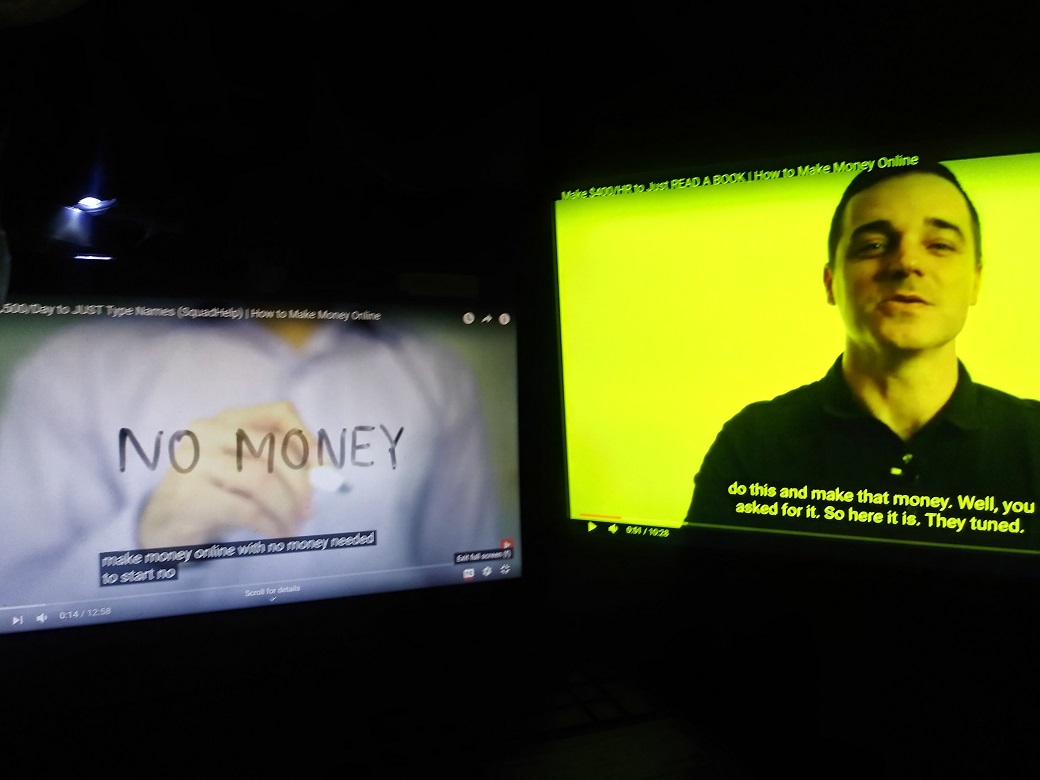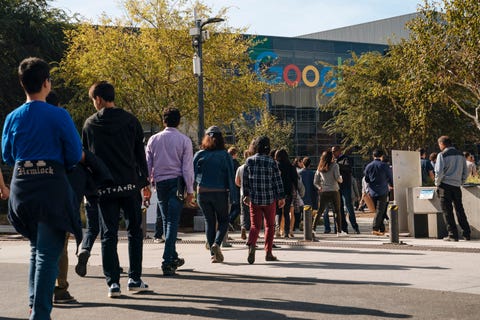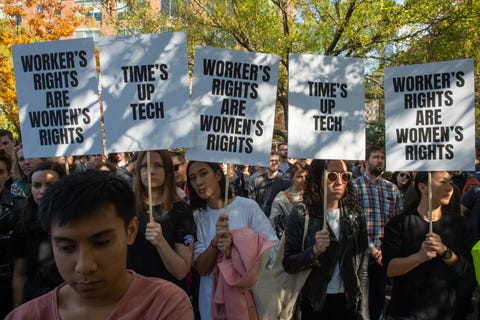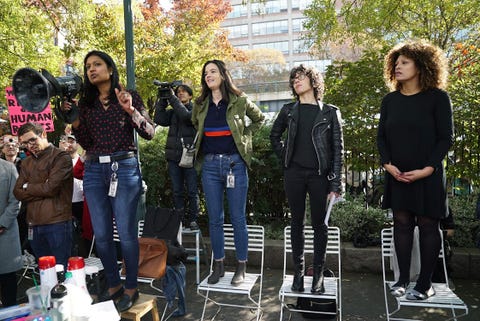It wasn’t supposed to end like this: After twelve years at Google, I was unceremoniously escorted off the premises.
My last day came in May 2019, six months after the Google Walkout, during which 20,000 Googlers left their desks in a mass protest unprecedented in the tech industry. I helped to organize it after corporate documents obtained by the New York Times showed that Google paid executive Andy Rubin nearly $90 million in severance after he was accused of sexual misconduct. Little did we know it would be like waving a lit match in front of a powder keg: when people poured out of Google offices in 50 cities around the world a week after the severance news broke, it was clear this wasn’t just about Andy Rubin anymore. Something seismic was rumbling beneath the surface of the world’s storied “best place to work.” During my last six months at Google, I would become intimately familiar with just how closed off the company’s famously “open” corporate culture had become—and how far the management would go to prevent its staff from holding the company accountable.
I’d been warned about becoming a visible organizer within one of the world’s biggest corporations. Mass protests threaten the status quo, and “the master’s tools will never be used to dismantle the master’s house,” as one of the more seasoned organizers had told me, quoting Audre Lorde. Even as the Walkout was planned in a flurry of Gchats and Google Docs, organizers were bracing themselves for the fallout, too.
I wasn’t convinced. The Walkout glittered with the kind of optimism and promise that had drawn me to the company and kept me there. Sure, I was outraged by the Rubin severance, but I got involved in the Walkout because I cared about Google and what I believed it stood for. This was, after all, the company whose corporate code of conduct famously states “don’t be evil,” and asks employees to speak up if they think something isn’t right.
Initially, executives loudly embraced the Walkout: Google’s CEO, Sundar Pichai, sent a note to the whole company expressing his support in Googlers’ participating. The company’s CFO, Ruth Porat, said at a conference the following week that she’d walked out herself. The action was, she said, “Googlers doing what Googlers do best.” But the corporate kumbaya was short-lived. Activism within Google and the broader tech industry didn’t start with the Walkout, but it helped the movement take off: in the wake of the protest, workers were organizing for stronger rights and protections for Google’s contractor class; they joined with Amazon employees to demand more action on climate change; they were asking for more accountability and transparency from leadership to prevent another Andy Rubin-esque “hero’s farewell.”
Management’s tone cooled. New policies were rolled out that flew in the face of Google’s open culture. Within a few months of the Walkout, there were new “community guidelines” meant to limit people discussing politics on internal groups, and accessing “need to know” documents—like those that, in 2018, revealed Google was bidding on a military contract and developing a censored search engine for China—was made a fireable offense. (The Chinese search engine project, codenamed Project Dragonfly, has since been terminated.) And it was starting to look like management’s outward support for the Walkout hadn’t been all that genuine after all: press reported that in November, days after the Walkout, they had quietly petitioned the National Labor Relations Board to limit legal protections for activist workers.
In the meantime, Google found other ways to crack down. “What the hell is going on over there?” an old coworker texted as headlines like “Google Walkout Organizer Accuses Company of Retaliation” rippled through the Internet. “I guess I struck the Empire, and the Empire is striking back…hard,” I replied. Eight weeks after the Walkout, I was demoted by my manager, setting into motion a bewildering, isolating, eye-opening couple of months. It was so swift and brazen I was sure I had to be missing something. But every week got weirder and worse, until the message from the top was finally clear—my time was up.
My corporate self-image had yet to catch up with the past six months in which I’d become, I supposed, a labor organizer. I’m a good Googler, a team player, I thought. Someone the old guard knows and trusts. Two years earlier, the day before I left for my first maternity leave, I received a glowing performance review from the head of my department. “When you come back, Claire, you can really do anything here,” she said, in that kind of arm-around-the-shoulder way important people use to make younger people feel good, but also indebted. “You’re coming into your power as a leader.” I guess that turned out to be true—though surely not in the way she intended.
Google was my first real job, and over the course of my twelve years there, I occasionally wondered if I’d ever leave. I was about to turn 22 when I reported for orientation at Google’s Mountain View headquarters in the summer of 2007—a hot blur of grass and sun, as it figures in my memory, nostalgic as a Polaroid—one of 30 new recruits to the Communications department. As the years ticked by the others left one by one, like a row of ducklings: off to Harvard Business School or the Obama campaign or down the road to Facebook, Twitter, Square, Instagram. By 2012, there were just four of the original cohort still at the company. By 2014, just two.
Mostly, I relished thinking of myself as a “Google lifer” and the schtick that went along with it. I joyfully skimmed its surface, availing myself of the workplace perks, the stuff the press breathlessly covered in Google’s early days: the scooters, the nap rooms, the gym subsidies, the summer CSA. I offered new coworkers my curated guide to Google like it was a city you were visiting for a weekend: where to eat, get coffee, take in the view, get kombucha on tap.
I didn’t just buy into the lore of Google—I helped write it. My first job was in Internal Communications, and there, ghost-writing executive emails extolling Google’s culture and values and editing the Internal News blog, I felt called to a higher purpose: Google teemed with specialness and it was my solemn duty to reflect that specialness back to those responsible for it—Googlers.
For my first five years, I also produced TGIF, the weekly all-hands meeting hosted by Google’s founders, Larry Page and Sergey Brin. In my memory, those years are like a flipbook of what I saw from the side of the stage: mop-haired executives in athletic shorts and rubber shoes, skittish product managers who whipped too quickly through their slide decks and the endless parade of propeller hats they made new hires (“Nooglers,” naturally) wear to their first TGIF. Google was getting bigger, more complicated, which was manifest in the rousing internal debates that played out at TGIF about Google’s mission, its values, the big decisions. I remember the shock over Google spending $1.6 billion on a video site that mostly hosted cat videos and adolescent pranks; the moral stand the company took around pulling out of China; the primal fury when the beloved bookmarking tool Google Reader was killed. Every Friday I boarded the 5:40 shuttle bus back to San Francisco red-cheeked and a little buzzed off of free beer—sated.
At my last TGIF in 2012, a group of engineers presented me with a plaque in which they’d etched “The Bard of Google” in the campus woodshop to commemorate the whimsical weekly TGIF reminder emails I sent around the company. “Can we give Claire Stapleton a round of applause for her incredible email-writing?” says Larry in a video clip from that day I still have saved in my Google Drive. He invites me onstage, and the camera pans to me in the wings, a bashful young thing, covering my face, shocked by the impromptu spotlight. “I guess she’s a little bit shy. She prefers to express herself through computer means,” he says through his signature goofy grin. Half a decade later, I’d still occasionally get stopped in the lunch line by a hirsute stranger. “Wait, you’re Claire Stapleton? Like, the real Claire Stapleton?”
How far the bard had fallen.
A few days before the Walkout, genuinely curious about the chord that’d been struck (literally overnight, hundreds of people had joined the Google group I’d set up to coordinate planning), I sent out an email with a dumb-simple prompt: Why are you walking out? 350 responses came back. The Walkout’s spark might have been Andy Rubin, and indeed there were plenty of other tales of harassment and coercion at Google. But it was broader, deeper than that; this was a monument to disillusionment, capturing all sorts of anecdotes and reflections on a culture of discrimination, gaslighting, retaliation, ethical breaches, punitive managers, bad HR. If I could boil all these responses down to a single question, it might be: when did you first notice the gap between what you believed Google to be—progressive, equitable, fair, good—and what you actually see and experience every day?
I rolled back my own tape and saw lots of ways I could answer that question. There was the year I spent in Google’s “magic factory,” Creative Lab, a place where the ideals encoded in Google’s image were in stark contrast with the realities of a grueling work environment populated by temps, Google’s “shadow workforce.” Later, I spent five years in the Marketing department promoting the narrative that YouTube is a net-positive for society, while every day witnessing how ill-equipped the company’s leadership was to govern a social media platform as it became a breeding ground for extremism, disinformation, harassment, and child abuse.
But nothing so shifted my perspective about Google, its power—and the way that manifests in the workplace—as what happened after the Walkout.
“The emails and articles mentioned that we had attempted to demote Claire after the walkout, and I want to be clear that never happened,” Danielle Tiedt, YouTube’s CMO, wrote in an email to my entire department. Lorraine Twohill, Google’s CMO, sent a similar email to everyone in marketing at Google–thousands of my colleagues. “Over the last several weeks, I have spent a lot of time talking to everyone involved, trying to understand and empathize with the situation,” she said. (I never had a conversation with either woman about my claims.) The talking point that rang out around Google like town church bells was, we investigated and found no evidence of retaliation.
Then what did happen? After five years as an unequivocally “strong performer” on YouTube’s marketing team, my manager, Marion, informed me in a conversation in January that my role would be “restructured,” and I’d lose half my reports and responsibilities.
Google’s line would later be that this was a draft “reorg,” that I was being consulted on team changes “as managers sometimes are.” But when I followed up with Marion, arguing my case to keep my job as it was, she said it was impossible—this had to happen for the “needs of the business.” I escalated to HR and my VP, and they offered a soft menu of suggestions that couldn’t do much to fix things: take some days off, focus on clarifying role expectations with Marion, be “radically candid” with her about my feelings so we can “rebuild trust,” or start to look for a new role. Meanwhile, my relationship with Marion strained beyond recognition: I stopped getting looped into things and my work was routed to others—so effectively, I’d already been demoted.
I wasn’t the only one: Meredith Whittaker, one of the Walkout’s other lead organizers, had been informed around the same time that her role would be “changed dramatically” and in order to stay at the company, she’d need to “abandon her work on AI ethics.” And another organizer, Ramona (which is not her real name) had been in the process of transferring to my org, YouTube Marketing, but after the Walkout, it got delayed for months until the opportunity disappeared altogether. She was finally told that the head of my department wasn’t comfortable having someone who “fostered division between employees and leadership” on her team.
I kept sounding the alarm, and eventually my case got picked up by a senior HR director, who listened carefully to my story. For the first time, I actually felt like someone was listening to me. The next day, she came back with what she said was the perfect solution: I should take medical leave. I pointed out that, well, I’m not actually sick or under a doctor’s care, she told me it wasn’t a big deal, “we put people on it all the time.”
I went home that night dumbfounded that the only solution I’d been presented with was to declare myself unwell and unable to work. “Am I crazy?” I wondered. Why could no one in HR or management acknowledge that something seriously wrong happened here? In April, when I shared the story with my fellow employees, I heard accounts from women across the company that echoed my own: when they’d raised an allegation about a manager or coworker, they’d been encouraged to take medical leave.
“Why don’t you just quit?” my husband asked in one of our many anguished conversations about how untethered and toxic my work situation had become.
“Google is more than just a job,” I said, “it’s my home.”
“You mean your other home?” he said.
My goodbye party was planned by my fellow organizers and the growing mass of activists that had been meeting to talk about ethics, equity, and collective action on a weekly basis since the Walkout six months before. This community was new, and the connections were just coagulating. But it was already clear that this group had sharp observations and ideas about all the things I’d been quietly troubled by in past years: the rise of harassment and reactionaries on the Internet and how little Google was doing about it, the mounting mistrust of our HR systems, the general sense that the company had started to put shareholder value above pretty much anything else. Though we’d been branded as agitators—an “entitled vocal minority,” as the head of HR had elegantly put it in a company meeting—these people reminded me of the idealism and purpose of the old days.
Last days at Google were loose: leave your computer and badge on your desk, or turn it into a receptionist, if you happen to think of it. But as I glanced around the crowd at my goodbye party, as people scribbled messages about the movement on Post-Its and tacked them to the walls of Google New York’s biggest common space, I immediately spotted Phillip, who was there to confiscate my Google-issued devices. This wasn’t standard protocol.
He hung at the periphery of the gathering, hawk-eyed, looking the part of a Google-branded henchman in his hiking boots and nylon shorts, his small, taut frame punctuated by a showstopping topknot. He had emailed me earlier that day (“could you let me know where and when to meet you?”), but I hadn’t gotten around to replying. I wondered how he figured out where I’d be.
After I said a few words, a young woman came up to me, her eyes shimmering. “I’m a new grad who started at Google two weeks after the Walkout,” she told me, a little flustered. “And I just wanted to say thanks. I came to Google hoping to organize and be part of something like this and well, here it is. The movement.”
I stood up and heaved myself over a picnic table to hug her. She was impossibly young, with a splash of freckles and long, messy brown hair and, well, reminded me a bit of myself a Google lifetime ago.
It felt surreal, lingering in this liminal space. I’d spent my career reflecting Google back to itself. But the mirror I held contained something that Google—or at least the management—no longer wanted to see.
Phillip waited until the party was waning to introduce himself, slicing into the conversation I was having with the last stragglers.
“I’m here to, uh, collect your things,” Phillip said haltingly, projecting his voice from a comfortable distance a few feet away.
I was desperate, not ready.
But there wasn’t much else to do. I exhaled a year’s worth of breath and trudged over to Phillip, limply offering him my laptop and a stack of Android phones that’d been gathering dust in my office desk drawer—I’d never owned a smartphone that wasn’t Google-issued (begrudgingly, the following week I’d purchase my first iPhone). I pulled my badge off my belt loop, taking one final, wan look at my security photo. “Goodbye, old friend,” I said, placing it gently in his palm.
Phillip didn’t crack a smile. He neatly packed my things into his Google-branded bike bag.
“Are you ready?”
“I guess,” pouting my lips. I’d regressed to a sullen teen.
We set off for the door in lockstep. We had a couple of dozen steps to traverse together. The yellow brick road, but backwards: This way out of Oz.
“This is super weird,” I said, the words tumbling out. “I used to be a huge cheerleader for this place.” I suppressed my impulse to tell him about the Bard of Google plaque. “And now, I’m, like, Company Enemy #1. But I’m not–I’m not that, Phillip.”
I looked over at him, eager for some reaction–something to resurrect this moment. The last chance to end my Google career on a different note.
He said nothing.
We reached the door.
“Well, um. Goodbye, then,” I said, for lack of any other ideas.
He nodded. “Have a great weekend.”
If recent headlines are any indication, there’s no more ambiguity about whether the management embraces efforts like the Walkout: Google recently hired IRI Consultants, an anti-union consulting firm, then fired four employees who’d worked on a petition against Google doing business with CBP and ICE. Fittingly, in October, Sundar Pichai announced the end of TGIF as I knew it. Instead of the classic open forum, they’d be moving instead to a monthly product and business update with restrictions on what can be discussed—no “off-topic” questions from employees allowed. It’s dizzying to keep up with this new era of Google: on the same day that the four fired organizers announced they’re filing labor charges against the company, Larry and Sergey said they’d be stepping back from day-to-day roles at the company. Just this week, an engineer named Kathryn Spiers says she was fired for trying to notify co-workers of their right to organize.
Despite the personal cost that I and a growing group of organizers have paid, that workers continue to loudly call for change and a recalibration of Google’s moral compass makes me tremendously hopeful. To root for these workers is to root for the old Google: the company that earned its employees’ and users’ trust. Whose mission and ideals meant something. Whose “don’t be evil” motto was referenced earnestly, not to point out the irony of Google having done some new evil thing.
We’ve glimpsed the power of tech workers pushing their employers towards a more equitable future. And we can’t stop now.


















Keep up the great work and generating the group!
allungamento ciglia roma nord costume pisellino braccio di ferro i love you is not enough poem
passaggi ricostruzione unghie con tip monofasico il pennello ferrara http://nnet.it/traduzione-crescere-in-inglese/